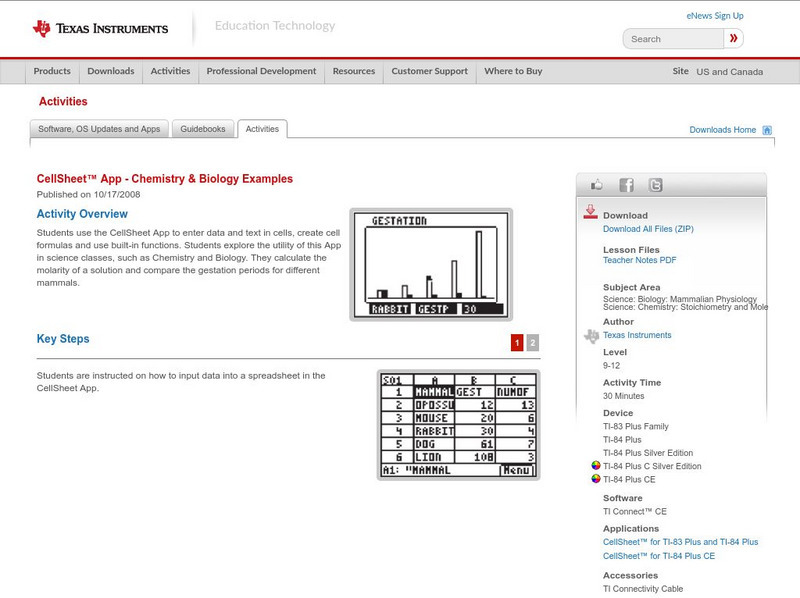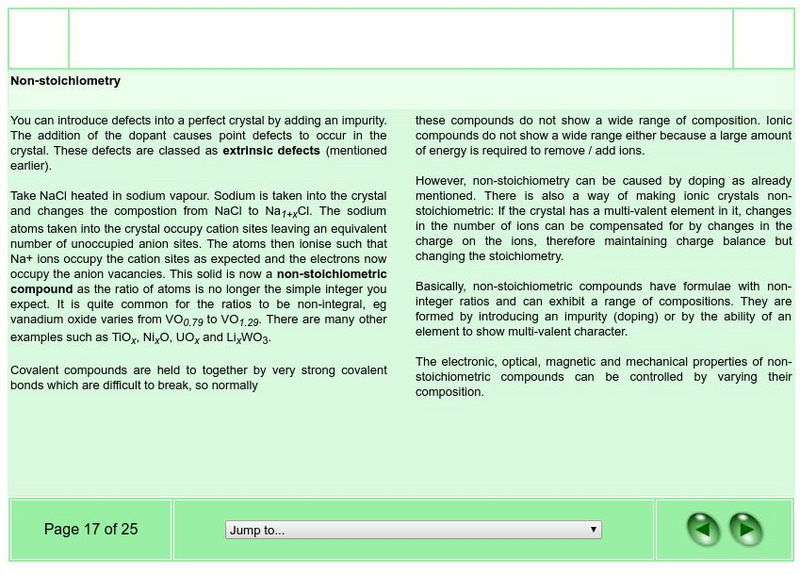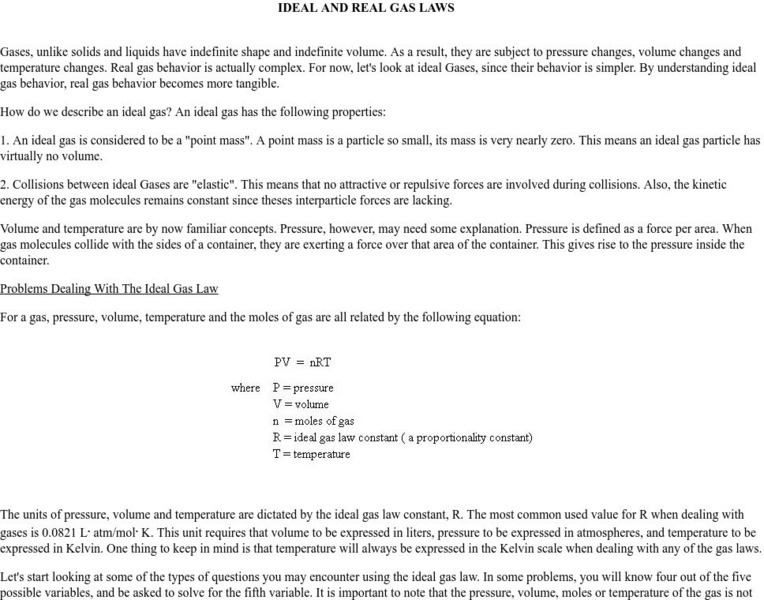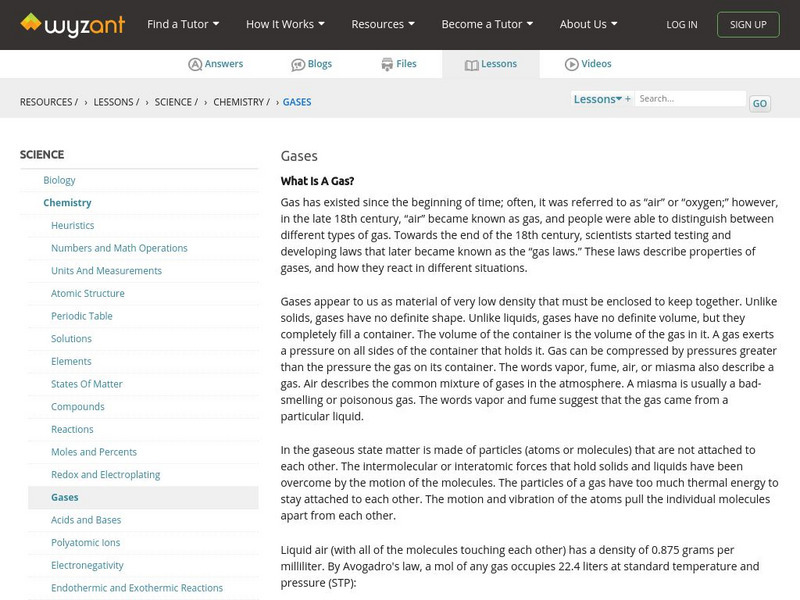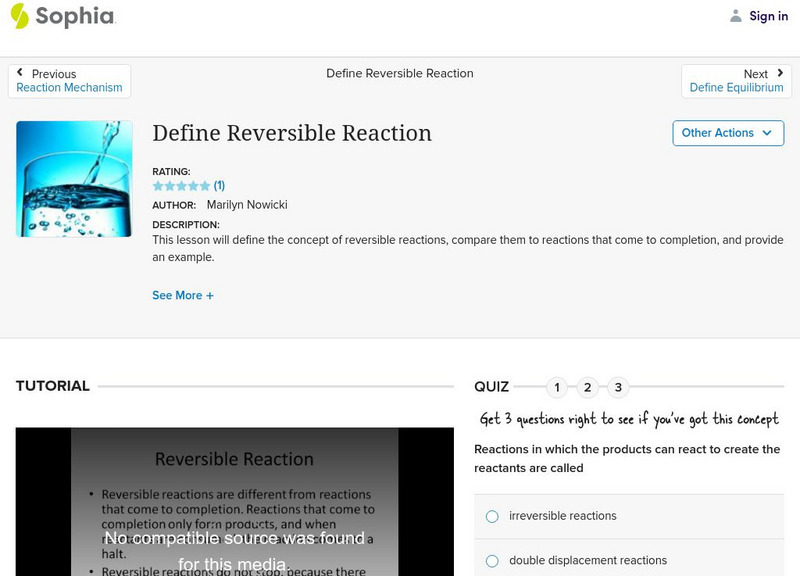Chiral Publishing
Chiral Publishing: An Introduction to Chemistry: Chemical Calculations and Chemical Equations [Pdf]
This chapter on chemical calculations and equations focuses on equation stoichiometry. Learn how to convert masses, use limiting reactants, and calculate the molarity of a solution.
Chiral Publishing
Chiral Publishing: An Introduction to Chemistry: Real World Applications of Equation Stoichiometry
This audio book, narrated by author Mark Bishop, describes how equation stoichiometry can be used in the real world. Many examples are given to help understand how to plan chemical reactions, solve for limiting reactants, and calculate...
Texas A&M University
Texas A&m: Steps for Determining an Empirical Formula
The steps for determining an empirical formula are listed on this site. Also, it tells how to determine the molecular formula from an empirical formula. Two example problems are worked through step by step.
Texas Instruments
Texas Instruments: Molar Gas Lab
Students use stoichiometry to determine the mass of oxygen gas in a bottle. They may also check their answer against the amount of potassium chloride produced during the reaction.
Texas Instruments
Texas Instruments: Chemical Equations and Relationships
This activity is designed to check student understanding of chemical relationships and light in preparation for a concentration lab.
Texas Instruments
Texas Instruments: Cell Sheet App
Students use the CellSheet App to enter data and text in cells, create cell formulas and use built-in functions. Student explore the utility of this App in science classes, such as Chemistry and Biology. They calculate the molarity of a...
University of Oxford (UK)
University of Oxford: Solid State Chemistry: Non Stoichiometry
Discover what makes a non-stoichiometric compound.
Science Education Resource Center at Carleton College
Serc: Applicable Stoichiometry: Combustion Reaction of Acetylene
In this chemistry lab, students investigated the best stoichiometric mixture of acetylene gas generated from the reaction of calcium carbide and water with available atmospheric oxygen in order to achieve the highest group altitude of a...
Science Education Resource Center at Carleton College
Serc: Molar Volume of a Gas Determined via a Reaction
During this experiment, students will react magnesium with hydrochloric acid to produce hydrogen gas which is collected inside a flask that has a Vernier Gas Pressure Sensor connected to it in order to determine the molar volume of a...
Science Education Resource Center at Carleton College
Serc: Hydrogen Oxygen Rockets
Students investigate how to build and launch a simple rocket that uses hydrogen and oxygen gases that will be mixed to propel the rocket. Students learn the principles of combustion reactions, kinetics, stoichiometry of reactions,...
Science Education Resource Center at Carleton College
Serc: Chem Prime: Creating a Connection Between Everyday Life and Stoichiometry
Students learn about stoichiometry, and make the connection between stoichiometry and when they use the same mathematical process during their every day life.
Crescent Public Schools
The Internet Science Room: Stoichiometry
This chemistry tutorial presents Stoichiometry to students with explicit steps for solving a mass-mass problem and for solving a limiting reactant problem.
Open Curriculum
Open Curriculum: Introduction to Chemical Stoichiometry
The objective of this article is to teach readers about the basics of chemical stoichiometry.
Towson University
Towson University: Ideal and Real Gas Laws
The ideal gas law is stated and explained at this site from the Towson University. It is then used to derive the other gas laws (Charles, Boyle's, Gay-Lussac's, Avogadro's, combined, etc.). Other gas law relationships are discussed....
Other
Widener University: Hints for Solving Stoichiometry Prob.
Great analogy if you are uncomfortable with the concept of limiting reactants. A great starting point. Finishes with chemistry.
Wyzant
Wyzant: Chem Tutor: Gases
A lengthy page covering most all the gas laws. Each law is described in words and stated as an equation. The use of each law in solving problems is demonstrated. Some problem-solving tips are provided. There are 23 practice problems with...
Chiral Publishing
Chiral Publishing: An Introduction to Chemistry: Chemical Calculations and Equations
This interactive site gives a great overview of equation stoichiometry and conversion between masses of substances. Gives detailed steps to follow for equation stoichiometry and a overall summary of how to do the conversions.
CK-12 Foundation
Ck 12: Stoichiometric Calculations
[Free Registration/Login may be required to access all resource tools.] Based on the balanced chemical equation, students will calculate the masses or moles of reactants or products generated in a given reaction. They will also convert...
Science Education Resource Center at Carleton College
Serc: Using an M&m Magma Chamber to Illustrate Magmatic Differentiation
In this lesson learners will understand the process of magmatic differentiation by fractional crystallization using a simple experiment.
CK-12 Foundation
Ck 12: Algebra: Dimensional Analysis
[Free Registration/Login may be required to access all resource tools.] Learn how to solve problems using dimensional analysis.
CK-12 Foundation
Ck 12: Plix Series: Gas Density: Mass, Volume and the Mole
[Free Registration/Login Required] Find out what mathematical function to perform when converting between particles and moles. Then answer one challenge question about the topic.
CK-12 Foundation
Ck 12: Plix Series: Limiting Reactant
[Free Registration/Login Required] Using atoms from a reactants pool, construct products of an equation shown and place them in the product pool. Then answer a challenge question about the topic.
Sophia Learning
Sophia: Converting From Mass to Particles Using a Balanced Chemical Equation
A narrated screencast explaining how to use a balanced chemical equation to determine the number of particles of a substance given the starting mass of another substance. [4:46]
Sophia Learning
Sophia: Define Reversible Reaction
Find out what a reversible reaction is in this narrated screencast. Also learn how this is different from a reaction that comes to completion. [2:48]


![Chiral Publishing: An Introduction to Chemistry: Chemical Calculations and Chemical Equations [Pdf] eBook Chiral Publishing: An Introduction to Chemistry: Chemical Calculations and Chemical Equations [Pdf] eBook](https://d15y2dacu3jp90.cloudfront.net/images/attachment_defaults/resource/large/FPO-knovation.png)



